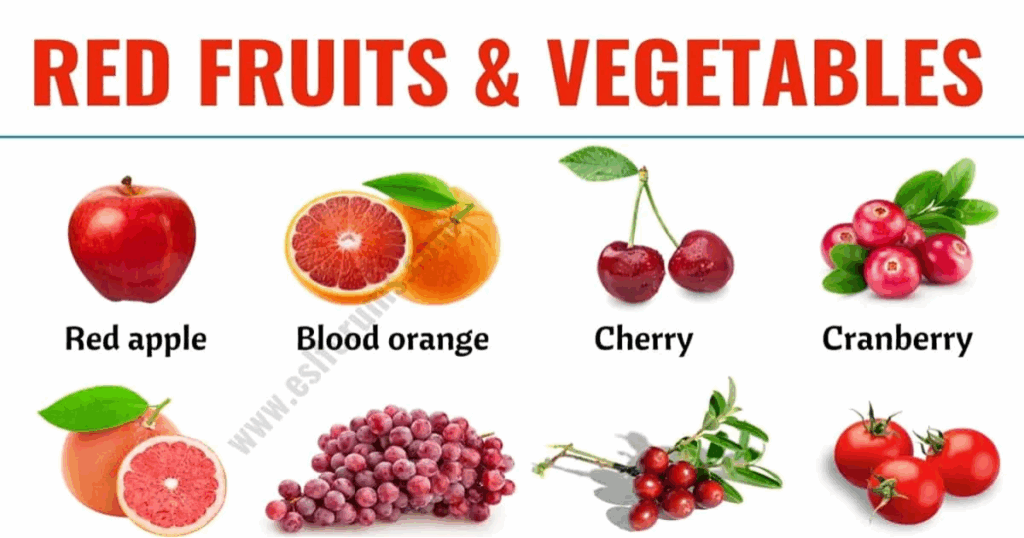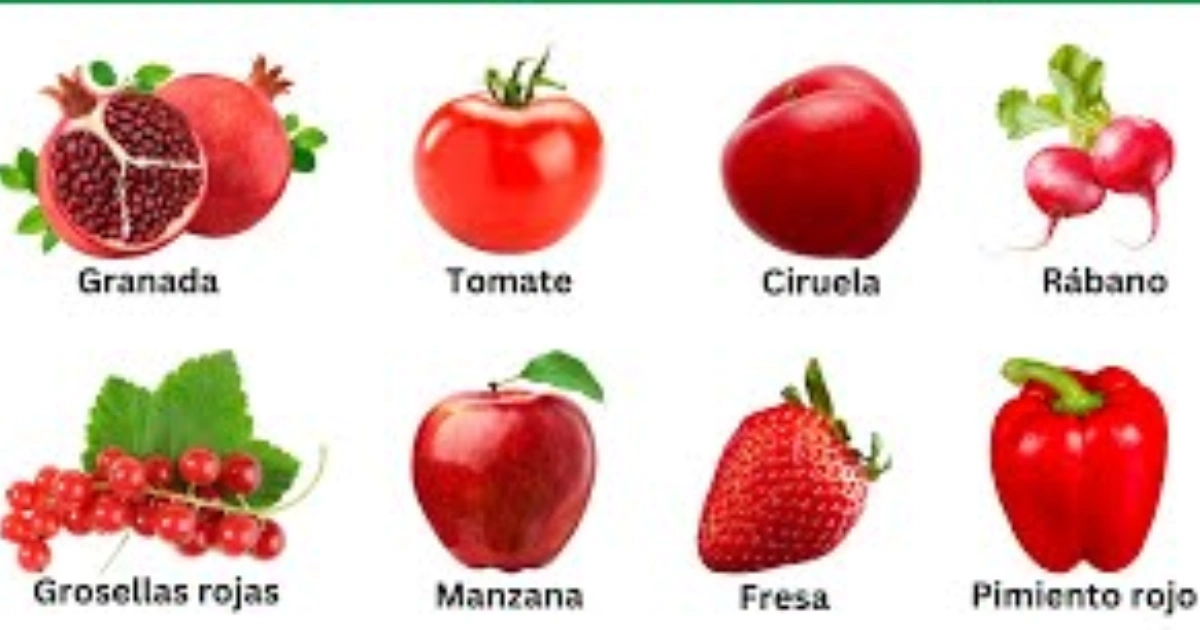When it comes to heart health, the vibrant red hue of certain foods isn’t just eye-catching—it signifies a powerhouse of nutrients that can fortify your cardiovascular system. Incorporating these red foods into your diet can help lower cholesterol, reduce inflammation, and improve blood circulation.
🥕 Why Red Foods Are Heart-Healthy
Red-colored fruits and vegetables are rich in bioactive compounds like lycopene, anthocyanins, and betalains. These phytonutrients have been shown to:
- Lower LDL cholesterol: Reducing “bad” cholesterol levels helps prevent plaque buildup in arteries.
- Reduce blood pressure: Certain compounds can help relax blood vessels, improving blood flow.
- Combat inflammation: Chronic inflammation is a risk factor for heart disease; antioxidants in red foods can help mitigate this.
- Enhance circulation: Improved blood flow supports overall heart function.
🍎 Top Red Foods for a Healthy Heart
1. Apples
Apples, especially with their skins, are rich in antioxidants and fiber. They can help lower LDL cholesterol and reduce the risk of heart disease.
2. Tomatoes
Tomatoes are packed with lycopene, a powerful antioxidant that helps lower blood pressure and reduce the risk of heart disease. Cooking tomatoes enhances the bioavailability of lycopene.
3. Red Bell Peppers
High in vitamin C and beta-carotene, red bell peppers strengthen blood vessels and improve circulation. They also contain antioxidants that combat oxidative stress.
4. Strawberries
Strawberries are loaded with vitamin C, potassium, and folate. They have been shown to lower blood pressure and reduce the risk of heart disease.
5. Cherries
Cherries are rich in anthocyanins, compounds that help control high blood pressure and protect against diabetes-related circulatory complications.
6. Raspberries
Raspberries offer numerous health benefits, including preventing chronic diseases, managing blood sugar, reducing signs of aging, supporting eye health, and improving cognitive function. They are rich in antioxidants such as vitamin C, quercetin, and ellagic acid, which help protect against heart disease, diabetes, and cancer.
7. Beets
Beets are rich in betalains, which have antioxidant properties. They also contain nitrates that can help lower blood pressure and improve blood flow.
8. Pomegranates
Pomegranates are rich in punicalagins and punicic acid—powerful polyphenols that support heart health, reduce arterial plaque, and regulate blood pressure. They provide higher levels of Vitamin C, potassium, Vitamin K, and about 4g of fiber per 100g, which aids in digestion and cholesterol management.

🛠️ How to Incorporate Red Foods into Your Diet
- Smoothies: Blend strawberries, raspberries, and cherries with a banana for a heart-healthy drink.
- Salads: Add sliced tomatoes and red bell peppers to your salads.
- Snacks: Keep apples and cherries handy for quick, nutritious snacks.
- Roasted Vegetables: Roast beets and red bell peppers with olive oil and herbs for a tasty side dish.
❌ Common Mistakes to Avoid
- Overconsumption of Processed Red Meats: While lean cuts can be part of a balanced diet, excessive intake of processed red meats is associated with increased risks of heart disease and other health issues.
- Neglecting Cooking Methods: Some red foods, like tomatoes, offer more heart-health benefits when cooked, as cooking can increase the bioavailability of certain nutrients.
- Ignoring Portion Sizes: Even healthy foods should be consumed in moderation to maintain a balanced diet.
🌿 Seasonal Tips
- Summer: Enjoy fresh strawberries, cherries, and tomatoes.
- Fall: Incorporate beets and apples into your meals.
- Winter: Pomegranates are in season and can add a burst of flavor to dishes.
✅ Quick Checklist for Heart-Healthy Red Foods
- 🍎 Apples
- 🍅 Tomatoes
- 🌶️ Red Bell Peppers
- 🍓 Strawberries
- 🍒 Cherries
- 🍇 Raspberries
- 🍠 Beets
- 🍈 Pomegranates
❓ FAQs
Q: How do red foods benefit heart health?
A: Red foods are rich in antioxidants and other nutrients that help lower cholesterol, reduce blood pressure, and combat inflammation, all of which contribute to a healthier heart.
Q: Can I eat red foods every day?
A: Yes, incorporating a variety of red foods into your daily diet can provide numerous heart-health benefits.
Q: Are cooked red foods more beneficial than raw?
A: In some cases, cooking can increase the bioavailability of certain nutrients, such as lycopene in tomatoes.


amoxicillin without prescription – https://combamoxi.com/ purchase amoxil without prescription
purchase forcan online cheap – click fluconazole 200mg for sale
buy lexapro no prescription – https://escitapro.com/ brand lexapro 10mg
buy cenforce 100mg pills – cenforcers.com buy cenforce no prescription
when does cialis patent expire – on this site cheap cialis dapoxitine cheap online
cialis leg pain – https://strongtadafl.com/# poppers and cialis
buy zantac 300mg without prescription – https://aranitidine.com/ ranitidine usa
viagra sale usa – cheap viagra now mastercard viagra buy sri lanka
The reconditeness in this tune is exceptional. how to buy accutane
This website absolutely has all of the bumf and facts I needed there this thesis and didn’t know who to ask. on this site
With thanks. Loads of knowledge! buy amoxil sale
I’ll certainly carry back to skim more. https://prohnrg.com/product/atenolol-50-mg-online/
This website exceedingly has all of the information and facts I needed about this participant and didn’t identify who to ask. propecia femme
The thoroughness in this draft is noteworthy. https://ondactone.com/simvastatin/
I couldn’t resist commenting. Adequately written!
buy cheap avodart
Proof blog you be undergoing here.. It’s hard to espy high quality writing like yours these days. I really appreciate individuals like you! Take mindfulness!! http://shiftdelete.10tl.net/member.php?action=profile&uid=200427
buy forxiga pills – this buy generic dapagliflozin over the counter
xenical order online – click purchase orlistat pills
More posts like this would create the online space more useful. https://experthax.com/forum/member.php?action=profile&uid=124822
You can keep yourself and your family close being alert when buying panacea online. Some pharmacy websites function legally and provide convenience, reclusion, cost savings and safeguards over the extent of purchasing medicines. buy in TerbinaPharmacy https://terbinafines.com/product/tamoxifen.html tamoxifen
Thanks on putting this up. It’s understandably done. acheter du clenbuterol
I’ll certainly return to review more.
https://t.me/dragon_money_mani/39
Appreciate the effort put into this. It’s always good to see quality content.
Great post! Really enjoyed reading this. Keep up the excellent work!
Спасибо, что поделились своими мыслями. Очень содержательно и заставляет задуматься.